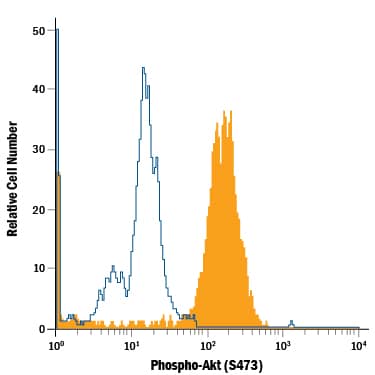Phospho-Akt (S473) PE-conjugated Antibody
R&D Systems, part of Bio-Techne | Catalog # IC7794P


Conjugate
Catalog #
Key Product Details
Validated by
Biological Validation
Species Reactivity
Human, Mouse
Applications
Intracellular Staining by Flow Cytometry
Label
Phycoerythrin (Excitation = 488 nm, Emission = 565-605 nm)
Antibody Source
Monoclonal Mouse IgG1 Clone # 545007
Product Specifications
Immunogen
Phosphopeptide containing the human Akt (S473) site
Specificity
Detects human and mouse Akt1, Akt2 and Akt3, when phosphorylated at S473, S474 and S472, respectively.
Clonality
Monoclonal
Host
Mouse
Isotype
IgG1
Scientific Data Images for Phospho-Akt (S473) PE-conjugated Antibody
Detection of Phospho-Akt (S473) in Jurkat Human Cell Line by Flow Cytometry.
Jurkat human acute T cell leukemia cell line either untreated (open histogram) or treated with 100 nM Calyculin A (Catalog # 1336) for 30 minutes (filled histogram) was stained with Mouse Anti-Human/Mouse Phospho-Akt (S473) PE-conjugated Monoclonal Antibody (Catalog # IC7794P). To facilitate intracellular staining, cells were fixed with Flow Cytometry Fixation Buffer (Catalog # FC004) and permeabilized with Flow Cytometry Permeabilization/Wash Buffer I (Catalog # FC005). View our protocol for Staining Intracellular Molecules.Applications for Phospho-Akt (S473) PE-conjugated Antibody
Application
Recommended Usage
Intracellular Staining by Flow Cytometry
10 µL/106 cells
Sample: Jurkat human acute T cell leukemia cell line treated with Calyculin was fixed with Flow Cytometry Fixation Buffer (Catalog # FC004) and permeabilized with Flow Cytometry Permeabilization/Wash Buffer I (Catalog # FC005)
Sample: Jurkat human acute T cell leukemia cell line treated with Calyculin was fixed with Flow Cytometry Fixation Buffer (Catalog # FC004) and permeabilized with Flow Cytometry Permeabilization/Wash Buffer I (Catalog # FC005)
Reviewed Applications
Read 1 review rated 4 using IC7794P in the following applications:
Formulation, Preparation, and Storage
Purification
Protein A or G purified from hybridoma culture supernatant
Formulation
Supplied in a saline solution containing BSA and Sodium Azide.
Shipping
The product is shipped with polar packs. Upon receipt, store it immediately at the temperature recommended below.
Stability & Storage
Protect from light. Do not freeze.
- 12 months from date of receipt, 2 to 8 °C as supplied.
Background: Akt
Long Name
v-Akt Murine Thymoma Viral Oncogene Homolog
Alternate Names
PKB, RAC
Additional Akt Products
Product Documents for Phospho-Akt (S473) PE-conjugated Antibody
Product Specific Notices for Phospho-Akt (S473) PE-conjugated Antibody
For research use only
